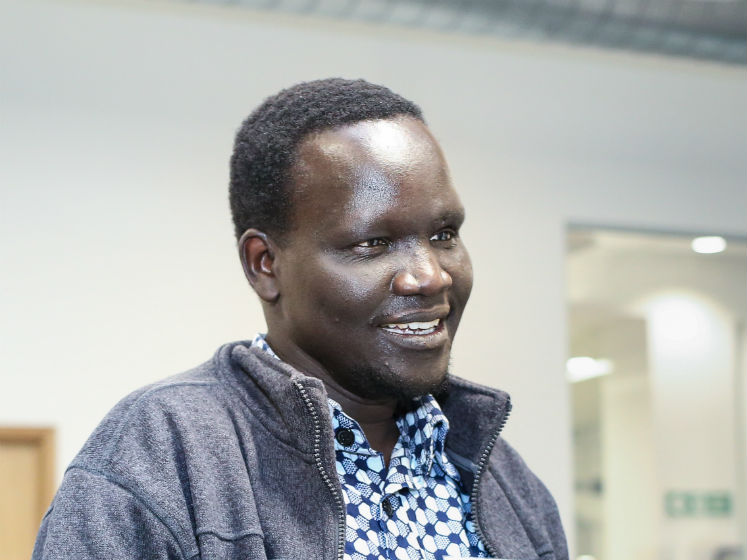 Atem Kuek
Atem Kuek
LSE student Atem Kuek discusses how he wants to use his experiences in Sudan as a displaced child, a child soldier and a refugee to help others.
“I’m sitting here today as a student at the London School of Economics and Political Science, but 20 years ago I was a refugee child, running from fear and war. Someone like me should do what they can to pay back,” says LSE master’s student Atem Kuek.
Born in Sudan, two years before the outbreak of the Second Sudanese Civil War in 1983, Atem and his family were forced to flee their village after the Bor Massacre of 1991 which claimed the lives of thousands of civilians. What followed was a gruelling six years where Atem lived as a displaced child and then a child soldier; living in military garrisons, receiving scanty schooling and being subjected to onerous and exhausting military drills. “The drills, tactics and strategies were too much for the tiny bodies and brains of children to absorb,” he remembers.
Although Atem’s parents sought refuge in Kenya he was unable to join them. Teenage boys were prohibited from leaving the country as they were expected to form the seedbed of the Sudan Peoples’ Liberation Army. In 1997, after peace talks created a narrow window for ceasefires in some parts of the country, Atem and some of his fellow child soldiers escaped their garrison and fled to Kenya where they registered as refugees.
It was here Atem was able to receive a proper education and attend the schools at the refugee camp. Through dedication and hard work he eventually completed secondary school and trained as a teacher on the camp, before saving up and attending the Uganda Christian University to study Mass Communication.
After graduating with a distinction, Atem worked for NGOs conducting aid work in the newly independent South Sudan. He believes helping others in this way is his true calling: “I grew up in the same crisis, so I understand the suffering in people’s faces. My experience took me back as an aid worker as I don’t want people to walk the same path I walked.”
After deciding he wanted to learn more about the theoretical side of humanitarian work, and hearing about LSE’s scholarship programme for students from Sub-Saharan Africa, Atem applied to the School and was accepted to study for an MSc in International Development and Humanitarian Emergencies.
“I was really excited when I was accepted and awarded my scholarship. I knew a school like LSE would give me everything I need and really help develop my interests,” he says. While at LSE he’s met with academics from a variety of departments to discuss his studies and dissertation – which focuses on the conflict in South Sudan and the resulting economic deprivation. “It’s like everyone who works on Sub-Saharan Africa at LSE is my academic advisor – even if they’re based in different departments. I get great help here and can’t waste it,” he laughs.
Atem has thrown himself into his course and is also heavily involved with the Programme for African Leadership, sponsored by alumnus Firoz Lalji (BSc Economics 1969) whose philanthropic support also includes scholarships for African nationals such as Atem. Firoz was born in Uganda but forced out of the country when Dictator Idi Amin expelled many of its Asian citizens.
As part of the programme, Atem and his colleagues took part in a competition where they pitched projects to help development in Sub-Saharan Africa. Atem’s group pitched the winning idea – a plan aiming to improve girls’ reproductive rights in Zimbabwe with the help of technology as a storytelling tool.
Their idea will now become a reality, to be implemented by a partner organisation in Zimbabwe. The group are currently busy writing scripts for animated videos which will be shown in schools to highlight issues such as child marriage and pregnancy.
Looking to the future, Atem hopes experiences like this and his studies at LSE will complement his practical knowledge as an aid worker and equip him with the best set of skills to help people in South Sudan – something he wants to get back to doing as soon as his exams are over. “Even years later with an independent South Sudan, masses of ordinary people continue to follow my troubled footpaths. It’s my dream that this must change,” he says.